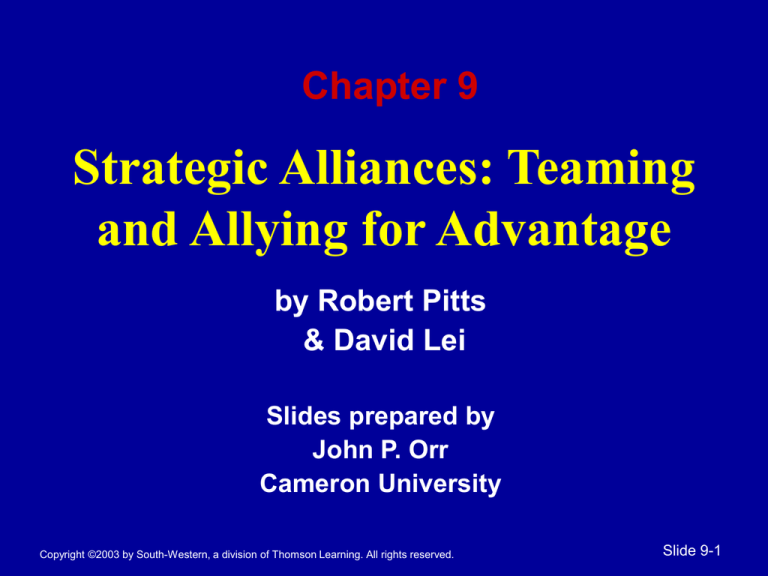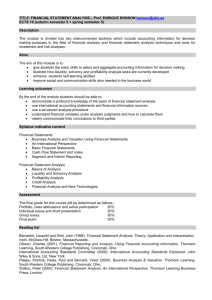
Chapter 9
Strategic Alliances: Teaming
and Allying for Advantage
by Robert Pitts
& David Lei
Slides prepared by
John P. Orr
Cameron University
Copyright ©2003 by South-Western, a division of Thomson Learning. All rights reserved.
Slide 9-1
What you will learn…
Slide 1 of 2
• The characteristics of a strategic
alliance
• Why companies around the world are
forming strategic alliances
• The different broad types of strategic
alliances, including:
– Licensing
– Joint ventures
– Multipartner consortia
Copyright ©2003 by South-Western, a division of Thomson Learning. All rights reserved.
Slide 9-2
What you will learn…
Slide 2 of 2
• The benefits and costs of entering into
strategic alliances
• How to balance the need for
cooperation with
competition
Copyright ©2003 by South-Western, a division of Thomson Learning. All rights reserved.
Slide 9-3
IBM’s Global Alliances
Slide 1 of 2
• Early Alliances: Responding to Japan
• IBM’s Initiatives During the 1990s:
Rebuilding Competitiveness
– Motorola
– Apple Computer
– Perkins-Elmer, Silicon Valley Group, and Elite
Systems
– Toshiba
– Siemens
– Phillips
Copyright ©2003 by South-Western, a division of Thomson Learning. All rights reserved.
Slide 9-4
IBM’s Global Alliances
Slide 2 of 2
• Current Strategic Alliance Initiatives
–
–
–
–
–
Electronic commerce
Telecommunications
Smart technologies
Health care
Ongoing relationships
Copyright ©2003 by South-Western, a division of Thomson Learning. All rights reserved.
Slide 9-5
Ex. 9-1. IBM’s Alliance Strategy
(Selected Categories)
Personal Computers
Factory Automation
• Matsushita (low-end
PCs)
• Ricoh (hand-held PCs)
•
•
•
•
Texas Instruments
Sumitomo Metal
Nippon Kokan
Nissan Motor
Telecommunications
• NTT (value-added
networks)
• Motorola (mobile data
pets)
Health Care
• Pfizer
• Microsoft
Copyright ©2003 by South-Western, a division of Thomson Learning. All rights reserved.
Slide 9-6
The Global Airline Industry
• Airline industry consolidation of 1990s
• From code sharing to combined
operations
• Network versus network
–
–
–
–
–
Northwest – KLM
American Airlines – British Airways
Lufthansa – United Airlines
Delta “Sky Team” alliance
“Oneworld” alliance
Copyright ©2003 by South-Western, a division of Thomson Learning. All rights reserved.
Slide 9-7
Ex. 9-2: Global Airline Alliances
Slide 1 of 4
Trans-Atlantic Linkages/Relationships
Airlines
Type of Alliance
• Northwest Airlines
• KLM Royal Dutch
Full partnership (antitrust immunity)
Wings alliance
• United Airlines
• Lufthansa
Full partnership (antitrust immunity)
Part of Star Alliance
• Delta Air Lines
• Swissair
• Sabena
• Austrian Airlines
Full partnership (antitrust immunity)
Relationship unwound in 1998-1999
Copyright ©2003 by South-Western, a division of Thomson Learning. All rights reserved.
Slide 9-8
Ex. 9-2: Global Airline Alliances
Slide 2 of 4
Trans-Atlantic Linkages/Relationships
Airlines
Type of Alliance
• Continental Airlines
• Alitalia
Code sharing, joint marketing (antitrust
issues pending)
• American Airlines
• British Airways
Code sharing, joint marketing (antitrust
request withdrawn)
• Delta Airlines
• Air France
• CSA Czech Airlines
• Alitalia
•Aero Mexico
Full partnership (antitrust immunity)
Sky Team alliance
Copyright ©2003 by South-Western, a division of Thomson Learning. All rights reserved.
Slide 9-9
Ex. 9-2: Global Airline Alliances
Slide 3 of 4
Globe-Spanning Linkages/Relationships
Airlines
Type of Alliance
• United Airlines
Star Alliance: Code sharing, joint
marketing; includes up to 17 partners in
• Lufthansa
• Scandinavian Airline 2002
System (SAS)
• Thai International
• Varig Brazilian
Copyright ©2003 by South-Western, a division of Thomson Learning. All rights reserved.
Slide 9-10
Ex. 9-2: Global Airline Alliances
Slide 4 of 4
Globe-Spanning Linkages/Relationships
Airlines
Type of Alliance
• American Airlines
• British Airways
• Cathay Pacific
• Qantas Airways
• Aer Lingus
• Lan Chile
• Finn Air
• Iberia
Code sharing, joint marketing,
arrangement for global flights. New
alliance known as ONEworld.
• Northwest Airlines
• Continental Airlines
• Japan Air System
Code sharing for Trans-Pacific flights
Copyright ©2003 by South-Western, a division of Thomson Learning. All rights reserved.
Slide 9-11
Factors Promoting Alliances
• New market entry
• Shaping of industry evolution
• Learning and applying new
technologies
• Rounding out a product line
Copyright ©2003 by South-Western, a division of Thomson Learning. All rights reserved.
Slide 9-12
Types of Strategic Alliances
• Licensing Arrangements
The least sophisticated and easiest-tomanage type of alliance
• Joint Ventures
The creation of a third entity representing
the interests and capital of the partners
• Consortia and Networks
Highly complex linkages
among groups of
companies
Copyright ©2003 by South-Western, a division of Thomson Learning. All rights reserved.
Slide 9-13
Licensing Arrangements
Primary reasons for entry
• A need for help in commercializing a
new technology
• Global expansion of a brand franchise
or marketing image
Copyright ©2003 by South-Western, a division of Thomson Learning. All rights reserved.
Slide 9-14
Ex. 9-6. Sun Microsystems’ Licensing
Strategy in the Early 1990s
Slide 1 of 2
Bipolar
Integrated
Technology
Texas
Instruments
Sun
Microsystems
Philips
N.V.
LSI
Logic
Copyright ©2003 by South-Western, a division of Thomson Learning. All rights reserved.
Fujitsu
Cypress
Semiconductor
Slide 9-15
Ex. 9-6. Sun Microsystems’ Licensing
Strategy in the Early 1990s
Slide 2 of 2
Company
Benefit of Linkage
Philips N.V.
Gives Sun access to European
market.
Phillips will specialize in RISC chips for
consumer and telecommunications products.
Texas
Instruments
Gives domestic credibility to new
product design
Fujitsu
Gives access to low-cost production
LSI Logic, other Provides for cross-licensing and
small firms
exchange of ideas
Copyright ©2003 by South-Western, a division of Thomson Learning. All rights reserved.
Slide 9-16
Joint Ventures
Primary reasons for entry
•
•
•
•
Vertical integration
Learning a partner’s skills
Upgrading and improving skills
Shaping industry evolution
Copyright ©2003 by South-Western, a division of Thomson Learning. All rights reserved.
Slide 9-17
Consortia and Networks
• Multipartner Consortia
Multipartner alliances designed to share an
underlying technology
• Cross-Holding Consortia
Formal groups of companies that own large
cross-holdings and equity stakes in each
other
• Industry-Spanning Alliance Networks
Firms sharing knowledge, costs, and risks
Copyright ©2003 by South-Western, a division of Thomson Learning. All rights reserved.
Slide 9-18
Risks and Costs of Alliances
• Rising incompatibility
• Risk of knowledge or skill
leakage
• Risk of dependence
• Strategic control
costs
Copyright ©2003 by South-Western, a division of Thomson Learning. All rights reserved.
Slide 9-19
Automotive Joint Venture Fades
Ford
Volkswagen
Autolatina
• Impasse on strategy to face General Motors
• Reluctance to share design, marketing ideas
Copyright ©2003 by South-Western, a division of Thomson Learning. All rights reserved.
Slide 9-20
Ex. 9-7. Deepening Dependence on
Alliance Partner
Sourcing for
components
Sustained
losses induce
resignation,
exit
Low price
deters future
investment
Domestic firm
feels price
pressure in
every market
based
on core
technology
Sourcing
extends to
joint venture
Alliance partner
becoming stronger,
attacks firm’s other
markets
Copyright ©2003 by South-Western, a division of Thomson Learning. All rights reserved.
Venture includes
shared technology
development
around core
Domestic firm
loses its core
competence
base
Slide 9-21
Balancing Cooperation and
Competition
• Understand the firm’s knowledge and
skill base
• Choose complementary partners
• Keep alliance personnel long-term
Copyright ©2003 by South-Western, a division of Thomson Learning. All rights reserved.
Slide 9-22
Alliances and Ethics
Two Critical Issues
• Balancing
collaboration and
competition within
the alliance
• The issue of loyalty
among personnel
assigned to the
alliance
Copyright ©2003 by South-Western, a division of Thomson Learning. All rights reserved.
Slide 9-23







